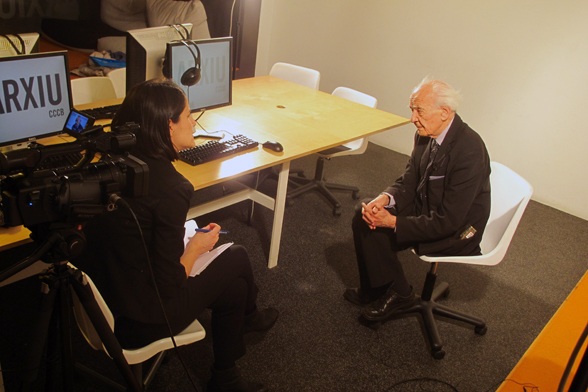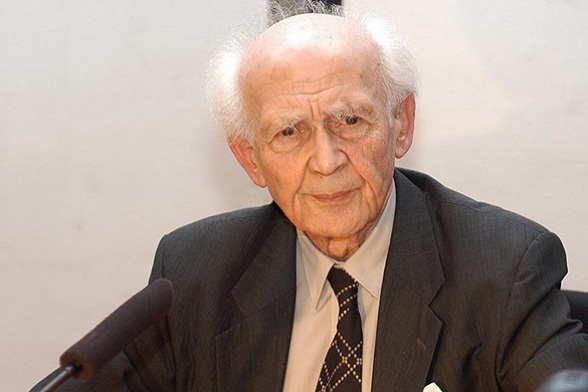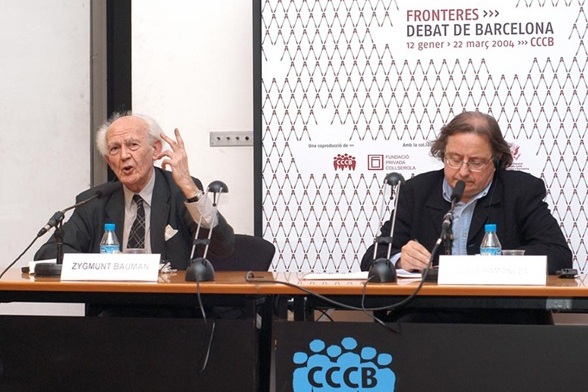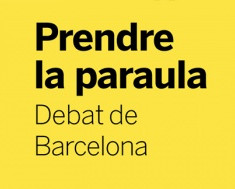Recalling anecdotes and moments shared with the sociologist-philosopher
If there is one name that will remain forever linked with the history of the Centre of Contemporary Culture of Barcelona, it is that of the sociologist-philosopher Zygmunt Bauman who died in Leeds on 9 January 2017 at the age of ninety-one. A few weeks before his death, the Centre for Documentation and Debates had contacted him to ask him to open the next Barcelona Debate, “Old Europe, New Utopias” . In his affable response, he did not decline the invitation but regretted that his state of health was delicate so, given the risk, said he would leave the final decision to the CCCB team.
The period from this recent contact and going back to 2004, which was the first time Bauman (who was then relatively unknown, at least in Barcelona) set foot in the CCCB, covers thirteen years and fourteen lectures, more than a decade of working together and relationship. We mourn our loss because Bauman was pleasant, friendly and loveable, but we also look back with pride because we have worked with one of the most lucid thinkers of our times and we have conserved a good part of his ideas in our archive.
We have published six books of lectures he has given at the CCCB in the series BREUS CCCB (published in Catalan and English): Noves fronteres i valors universals (New Frontiers and Universal Values), Arxipèlag d’excepcions (Archipelago of Exceptions), La felicitat es fa, no es compra (Joys of Life Made, Not Bought), and El destí de la desigualtat social en la fase líquida de la modernitat (The Fate of Social Inequality in Liquid-Modern Times) and, in the DIXIT series (in Spanish), Archipiélago de excepciones (Archipelago of Exceptions) and Múltiples culturas, una sola humanidad (Many Cultures, One Humanity) as well as two articles in the publications Fronteres and Europe City.
On our website it is also possible to consult videos of his lectures, an interview and a chronicle of the last debate in which he appeared. This, in 2013, was followed by more than 700 people in the CCCB hall, which made him not just one of the oldest speakers at the CCCB but also one of the most popular with the public. He was our very own rock star (and we were his fans!), so we would like to remember him from a more personal standpoint. We have asked several members of the CCCB team who had more direct dealings with him—the former director of the CCCB Josep Ramoneda; the head of the Centre for Documentation and Debates, Judit Carrera; the head of press, Mònica Muñoz; and the debates coordinator Susana Arias—to share their memories of Zygmunt Bauman with us.
“Bauman’s words were totally in tune with the spirit of the CCCB” Josep Ramoneda, former director of the CCCB
On 22 March 2004, Zygmunt Bauman gave his first lecture at the CCCB. Small, full of energy, accompanying his words with gesticulating arms and hands which made him fill the stage more and more, he gave a true lesson in a genre which is antiquated, or so it is fashionable to believe. Yet I have found few forms of presentation and discussion of ideas that can improve upon a good lecture. Bauman’s was precisely that. PowerPoint and panel discussions have wrecked a genre that is highly exigent. In order to give a good lecture, it is not enough to think about it and write it up. You have to deliver it. And delivering it is very difficult. PowerPoint is a great enemy of the good lecture. A lecture is an act of creation which, as such, is submitted for the interpretation and consideration of the audience.
That day, Bauman explained to us how, in the city, general and abstract statements about conflicts between civilisations and cultures are translated into the experience of relationships with specific individuals, for example the people next door or from the neighbourhood. To paraphrase, he said that you don’t know these people as walking embodiments of an imminent clash of civilisations but as shopkeepers, waiters, workers, people who work in the same factory as you do, neighbours, parents of your children’s classmates and, little by little but unfailingly, they keep shifting from the abstract category of “alien civilisation” to that of individual human beings. Hence, slowly, and not without moments of conflict, fear of the great unknown begins to dissipate and the terrifying foreigners are no more than ordinary human beings with the same desires and wishes as you.
Bauman’s skilfulness with metaphors, the secret of his publishing success—and how much sociological soup has been cooked up from his liquid society!—has meant that he is also sometimes pigeonholed. But, that day, his words were totally in tune with the spirit of the CCCB.
Another memory I have is the day we opened a seminar with a discussion between him and Giorgio Agamben. I was impressed by the compelling power of the maestro’s presence. Everyone expected a certain theoretical confrontation and yet Agamben behaved like a young man intimidated by authority. He simply let Bauman lead the way.
Bauman has many potent expressions, but one will always be with me. To paraphrase again, he pointed out that one of the great catchwords of the twentieth century was liquidate: liquidate the Jew, liquidate the class enemy. We must make sure that the main programme of the twenty-first century does not turn out to be that of liquidating mankind. These words sum up an intellectual life that was very typical of the last century: a Polish Jew who escapes the Holocaust, who grows up and is trained under the post-war communist regime in which he comes to occupy a position of responsibility in the military, and who goes into exile in 1968 at a time of a certain anti-Semitic crusade, first to Israel and then to Leeds where he forges his intellectual career. His vigour emanated life and his cordiality was warming.
A Most Surprising Interview. Mònica Muñoz-Castanyer, head of press at the CCCB
I remember most especially Lluís Amiguet’s interview with Bauman in November 2005. In order to ensure a good interview, it is necessary to give both interviewee and interviewer sufficient time and a comfortable setting. Neither of these was provided on the occasion of this interview for La Contra (the back page) of the daily La Vanguardia. Having prepared a lot of interviews for Bauman, which he resignedly and gracefully accepted, we led him to different parts of the CCCB, always in the company of his wife. First, there were photos in the courtyard, the Pati de les Dones, then a meeting with journalists in the Mirador space and, next, a recorded interview for the CCCB Archive. Bauman was showing signs of impatience and his wife was nodding her approval. But the main interview was yet to come: one hour with Amiguet!
We had already crossed the passageway on the first floor, heading for a meeting room in the CCCB office space where we had planned to hold the interview, when Zygmunt Bauman raised his arms, opened his left hand (in the right hand he was holding his inseparable pipe) and, in the middle of the chill-out area (a break space for workers on the office floor on the CCCB with coffee and snacks machines), said, “We’ll do the interview right here.” Before I could convince him to change his mind, he and his wife were sitting in the chairs of the chill-out space. I broke out in a sweat. The journalist sat down beside him, turned on his recorder and started the interview. It was a total disaster. Added to the infernal racket of the old escalators, were the rumbling of the dispensing machines, footsteps, voices of the Centre’s workers moving from here to there, and sounds of visitors wandering around the CCCB at the time. It was one hour of utter torment which, nonetheless, turned into this Contra in La Vanguardia. We have never again held an interview in the chill-out space and, thanks to Zygmunt Bauman, I will always be well-equipped to tell people where one should never hold an interview.
Visiting Bauman in Leeds. Judit Carrera, head of the Centre for Documentation and Debates
I visited Zygmunt Bauman at his home in Leeds in the winter of 2008. The father of the theory of liquid modernity had been living in that house for thirty-seven years, sharing it with his wife Janina in a marriage that lasted 62 years until she died in 2009. They both welcomed me with their usual friendliness and, displaying an excellent sense of humour, assured me that their long marriage was the exception that confirmed the rule of a liquid world. Their mutual deep understanding was evident. They spoke Polish together and, at times, rather stiff English. They worked in different parts of the house and met twice a day to smoke together. They said that smoking was a routine, a way of thinking. And they smoked non-stop
Their house was a typical two-storey English home in a narrow street near a big avenue which cut them off from the centre of Leeds. Cosy and with a Central European feel, it was austere but full of books. Their messy library had not diminished even though they had ceded 2,500 volumes to Prague University to express their gratitude to a city which had taken them in after they were expelled from Poland when the communist regime embarked on an anti-Semitic campaign in 1968. Three years later, in 1971, they arrived in Leeds, invited by the university there. After that Zygmunt Bauman never moved from Leeds or its university. It was surprising that a man with such solid pillars in his life should have been so able to interpret the uncertainty and fluidity of today’s world.

Judit Carrera entrevista Zygmunt Bauman l’última vegada que el sociòleg va visitar el CCCB, Jordi Gomez, 2013
Despite their advanced age, they were lucid, very well informed and up-to-date. They asked me about the CCCB, about the newly inaugurated high-speed train between Barcelona and Madrid, and the Law of Historical Memory. Owing to Janina’s delicate health, they were no longer travelling but were still writing because writing, they said, was their way of life. Their manners were exquisite and their happiness contagious. Yet there was also a hint of a certain tension between their vivacious curiosity and the slowness imposed by age.
After some hours, Bauman walked with me to the taxi and authorised me to publish one of his texts in the “BREUS” collection. Saying goodbye, he added that, as long as he lived, we could always count on him.
Bauman’s Last Email. Susana Arias, debates coordinator
Our last correspondence with Bauman was just a few weeks ago when we invited him to open this year’s Barcelona Debate. With his usual loyalty to the CCCB, he thought about the invitation to return to “my beloved Barcelona” but warned us that his fragile health all but ruled out travel. He ended his email saying, “Think about whether it’s worth running the risk,” and closing with “Love – Z”.
In his memory and to farewell him in the company of the audience that so greatly admired him, we shall dedicate the Barcelona Debate 2017, “Old Europe, New Utopias”, to Zygmunt Bauman. The Debate opens on 6 February.
We have opened a space in the CCCB Archive where members of the public can consult a collection of Zygmunt Bauman’s work.










